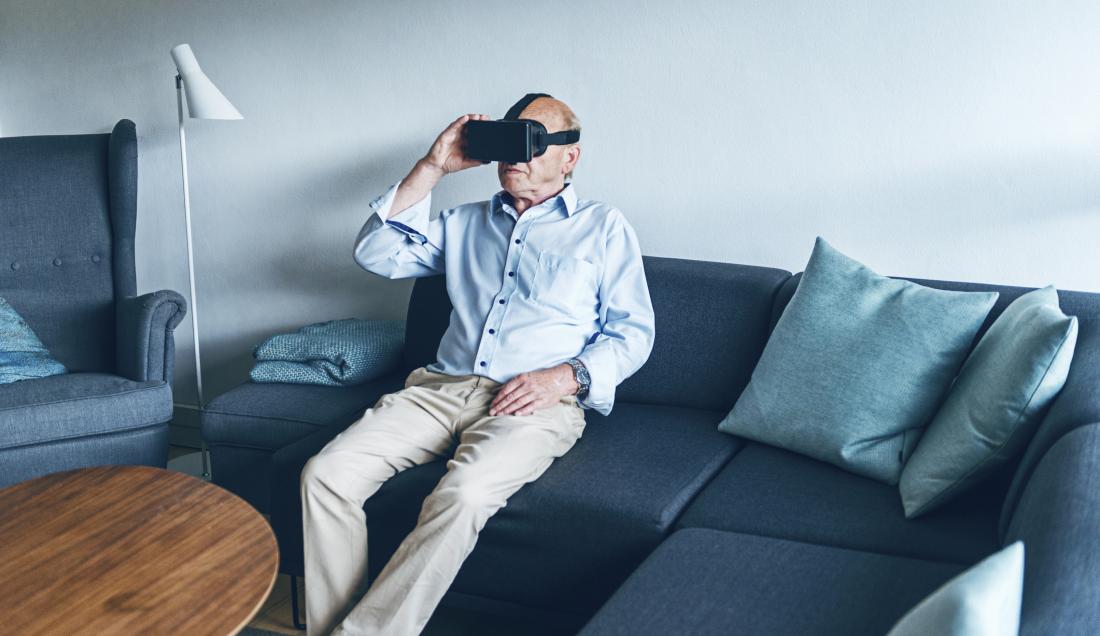
VR headsets may soon serve as a better alternative to standard testing for Alzheimer’s.
Dementia is a general term to describe the impairment of cognitive functions such as memory, thinking, and communication.
The cognitive decline associated with dementia is progressive, and people may go through different stages.
Mild cognitive impairment (MCI) is an early stage of dementia, but some people with MCI do not develop Alzheimer’s disease.
MCI can result from anxiety or normal aging, so it is important to establish the cause to evaluate the risk of dementia.
Alzheimer’s is the most common type of dementia. According to the World Health Organization (WHO), about 50 million people in the world have dementia.
Doctors diagnose dementia in around 10 million people every year, and 60–70% of these new diagnoses detect Alzheimer’s disease.
Several cognitive tests can assess dementia, but recently, researchers have been exploring the potential of new technologies to monitor the condition.
A new study from Cambridge University in the United Kingdom — the results of which now appear in the journal Brain — shows that virtual reality (VR) may be more accurate than standard tests.
Testing for navigation problems
The entorhinal cortex is part of an internal “satnav” that helps us move around and not get lost; it is also one of the first regions of the brain that Alzheimer’s disease damages.
Prof. John O’Keefe, from University College London (UCL) in the U.K., discovered this positioning system in the brain and subsequently won a Nobel Prize in Physiology or Medicine.
As current cognitive tests are available are unable to test for navigation difficulties, a team of researchers at the Department of Clinical Neurosciences at the University of Cambridge — in collaboration with Prof. Neil Burgess at UCL — developed a VR navigation test.
The researchers recruited 45 people with MCI and 41 people without it. They gave them all a VR headset and asked them to walk in a simulated environment.
To look for biomarkers of Alzheimer’s disease in people with MCI, the researchers took samples of their cerebrospinal fluid (CSF). Twelve of the participants tested positive. Overall, those with MCI performed worse on the navigation test than those without MCI.
The study showed that people with MCI with positive CSF markers performed worse than those with negative CSF markers. Also, the VR navigation test was more effective in differentiating between people with MCI at low and high risk of dementia than standard tests.
“These results suggest a VR test of navigation may be better at identifying early Alzheimer’s disease than tests we use at present in the clinic and in research studies,” says Dennis Chan, Ph.D., who led the team.
Developing future drugs with the help of VR
VR may also be a useful tool during clinical trials for future drugs. These trials usually involve animal tests. Scientists study the effect of drugs using water mazes, wherein mice have to locate hidden platforms under dark pools.
If the initial animal trial is successful, the next stage involves human participants. The test usually includes word and picture memory tests. The difference between the animal and human test represents a big problem for trials because results are hard to compare.
“The brain cells underpinning navigation are similar in rodents and humans, so testing navigation may allow us to overcome this roadblock in Alzheimer’s drug trials and help translate basic science discoveries into clinical use,” explains Chan.
He adds that scientists have been interested in exploring the role of new technologies in medical diagnosis for a while, but VR technology has only recently reached the point where scientists feel comfortable using it for tests in humans.
Chan and colleagues are working to develop apps for smartphones and smartwatches that track changes in everyday activities and detect early signs of Alzheimer’s.
“We live in a world where mobile devices are almost ubiquitous, and so app-based approaches have the potential to diagnose Alzheimer’s disease at minimal extra cost and at a scale way beyond that of brain scanning and other current diagnostic approaches.”
Dennis Chan, Ph.D.
